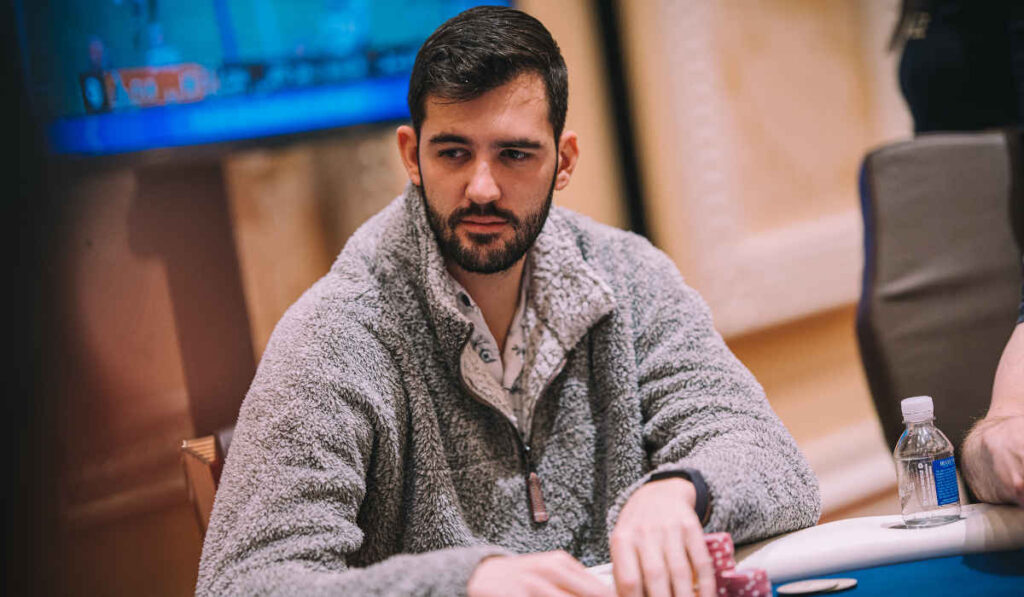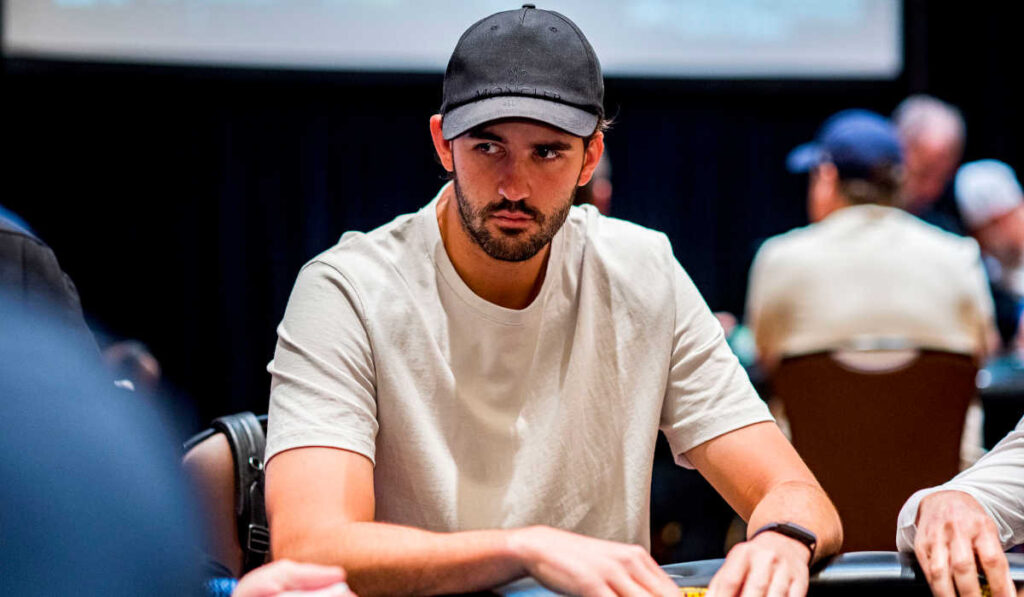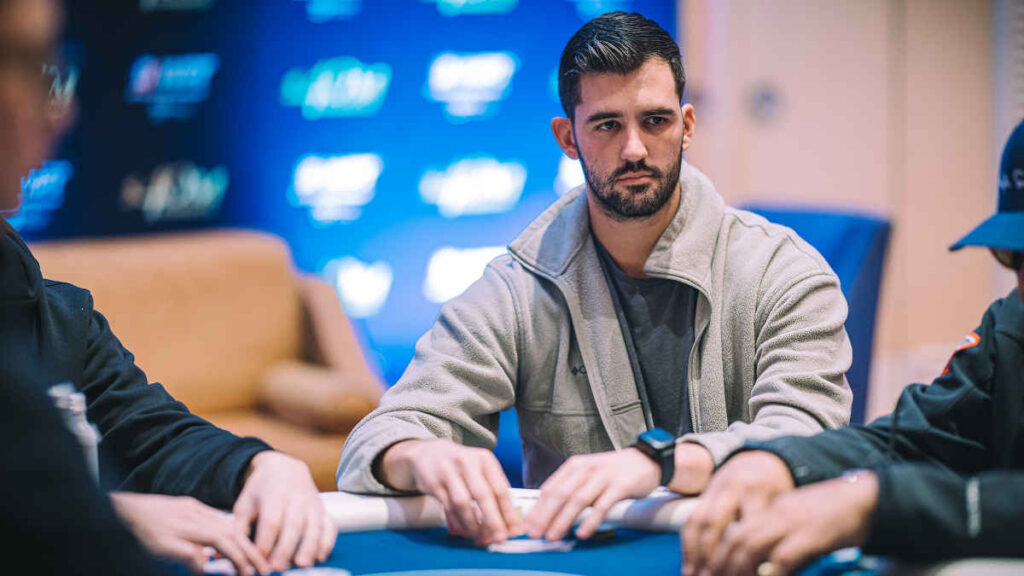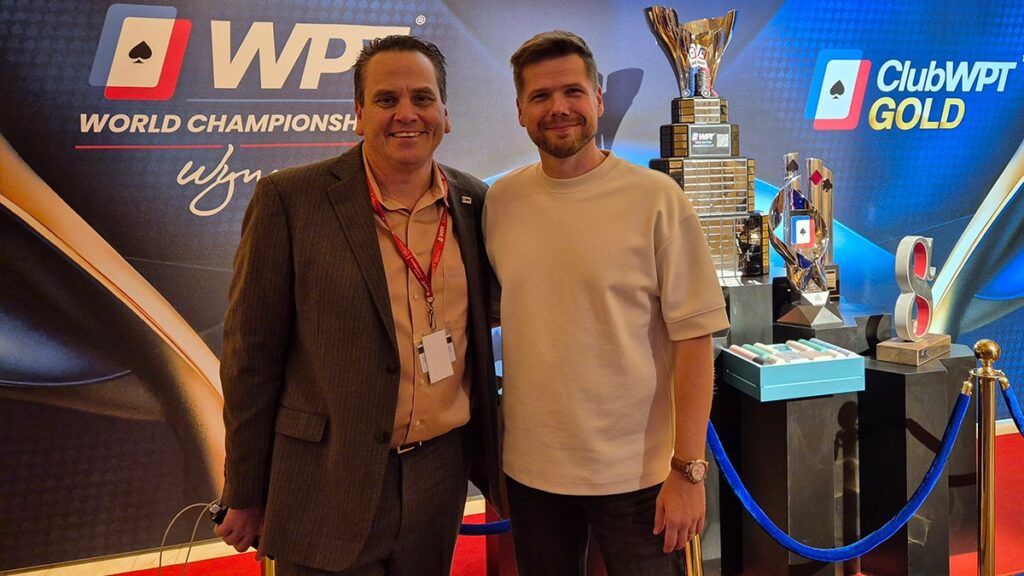Images courtesy of World Poker Tour
Few of poker’s elite have connected with the poker watching public in recent times like Justin Saliba. Battling hard in the toughest tournaments on the planet, Justin captured the hearts of the nation earlier this month when asked about his latest major win, the Poker Masters title.
Clearly emotional, the moment of winning gave Justin the opportunity to thank those closest to him and lifted the lid on what it takes to win big at the most intense poker tables in the world.
We caught up with one of poker’s hottest modern legends to find out what makes him tick and how the hard work he’s put in is only just starting to pay off.
The Poker Master
Justin’s recent Poker Masters title and emotional interview with PokerGO’s Donnie Peters about the lengths he’s had to go to in order to win in poker were highly revealing. When he first set out in poker, Justin did it out of pure enjoyment of the game.
Luckily, I always loved poker,” says Justin. I loved playing, and I really loved studying – it never felt like work. At the beginning, I was just so happy to spend all day consuming every piece of poker content I could find and then play all night. I’d wake up, review my hands in the morning, consume every piece of poker content I could find that next day, then play again.
As Justin progressed in the game, he began to realize that playing bigger than the online mid-stakes meant he was climbing the ranks. The pressure increased with the level of buy-in.
I distinctly remember having a little bit of a panic the first time I played a $5k tournament in 2020 and played with some top players. I just remember thinking to myself, ‘Well, OK, let’s look at a guy like Darren Elias or Stephen Chidwick.
They’ve been playing for a decade plus. They’ve been studying and thinking deeply about the game for over a decade. How in the world can I catch them? I don’t think of myself to be smarter than them, so where in the world can I find an edge?
That was when Justin saw what he could do. He could dedicate more time to studying the game than anyone, believing that if he could just ‘outwork all of the top guys’ then he’d catch up. Then the day after, he could do it again.
I built little competitions in my head, and I just tried to focus on working harder than my perceived competition each day. If I win the day over and over again, at some point, I’ll get to where I want to be in the game.
1st Poker Masters🏆 This one really meant a lot to me today. Thanks for all the love ❤️ https://t.co/O7eLqt90Bs
— Justin Saliba (@Justin_Saliba) October 2, 2025
Super Support System
Justin spends a great deal of his time playing and studying poker, but his personal support system is vital to his success. From his girlfriend, Maila, a skilled chef, to his family, Justin is held up by those around him, and this is never more important than when he’s playing high stakes poker.
I think having a good support system is everything, and I think that the landscape has changed a bit at the high stakes over the last 10 years. It could be due to the average age moving up, but from a personal life standpoint, it really seems that pretty much every high stakes player has stability in their life and a lot of support.
There are very few fun, degenerate guys flying around the world, partying their face off, and having success at the highest stakes.”
The lifestyle of a poker professional has changed vastly in the past 20 years or so. Gone are the major excesses attached to the best players in the world. Legends like Erik Seidel and Daniel Negreanu have shown that discipline and adaptability go a very long way. A support system is vital to back that up in Justin’s eyes.
Poker requires a lot of effort and dedication, a pretty sporadic travel schedule, and large financial swings. So having a home-life that is stable and loved ones that support and love you no matter how that stuff goes is a huge part of sustainability at the high stakes. It allows you to bring the best version of yourself every day at the tables, where your mind is still, focused, and not distracted.
An Emotional Minefield

Poker is often about restricting emotions during gameplay. Those emotions come out after the last hand has been played, and that can be difficult for players to process, whether they win or lose.
I used to think that it was all about restricting your emotions during gameplay, but I think it’s really about harnessing your emotions with total control, rather than restricting or suppressing them, Justin describes.
After the tournament, there is definitely some emotional dump that occurs, and everything kind of comes to the front of your mind. When the focus is on the process, rather than the short-term wins and losses, when you lose, you simply keep going.
As Jonathan Little says, ‘volume cures variance,’ and Justin says that following his fellow pro’s mantra has helped him put his mind directly into the next session.
Go through the hands you played, try to improve even if it’s 0.0001% for the next session, prepare well, and go to the next tournament with full focus and confidence to perform at a very high level.
Processing victories can be even tougher, as Justin sees it.
Any great poker player understands how much luck is involved in the short term, but when you win, I think that there is just this sense of gratitude and a culmination of the effort and process that brought you to that point. The process should be the same, though.
Review, improve, prepare, perform, and just keep going. Winning one tournament means nothing; longevity and sustaining success over a long period are everything. You have to try to keep the process the same and stay hungry whether you win or you lose.
Hungry for the High Stakes
Playing high stakes tournaments, especially at the PokerGO Studio, feels much more elite than in other spots. Often, the same faces gather, and Justin will take to the felt, knowing many of his opponents very well. Adapting from those types of events to larger field series such as Triton or WSOP events is tricky, but Justin thrives on the pressure it brings.
It’s quite enjoyable to have some variability in the tournament size, the city you’re playing, or the style of poker. I love playing at the PokerGO Studio.
But, sometimes, you’re just in the mood to try to navigate a 2000-person tournament rather than a 100-person tournament or some super high stakes action overseas. Each venue and style have their own challenges, but for me, they’re all very enjoyable.
Justin referenced in his recent winner’s interview that finishing second or third in big events can be painful and can take time to process. To keep believing in closing out events when the trophy has been snatched away from you is hard work. When you win, of course, it feels so much easier, and that mental burden lifts. Justin’s ability to process those lonely moments where the only thing he has is the voice in his head is paramount to his success.
I think you have to just really lean into the ‘why’ behind what you’re trying to achieve. That and your self-talk and belief, I think, are two of the most important things to spend time on in those moments.
My motivation comes from my support system and using poker as an avenue to honor and give love to everyone that’s believed in me and is going through the journey with me.
It would be easy to presume that, with poker’s bright neon-lit winning photos and brand sponsors in the foreground of many winners’ photos, money, accolades, and the lifestyle of a poker star are important to that player. They look like what winners chase. But as we discovered, that’s not the case with Justin anymore.
These things do very little for me, he admits. Any time throughout my career where any of that has been the goal and I’ve reached it, I’ve felt lonelier than before I reached it.
So, it’s really pushed my motivation and purpose to try to focus on the things bigger than myself, and that deeper motivation keeps me hungry in those moments where I’m not winning.
Being confident at the poker table is extremely important, and Justin is constantly able to ‘top up’ that belief due to the people around him more than in any single process or strategy. The reason why is an absolute core driver to winning.
Believing that despite getting punched in the mouth repeatedly like every player will have at some point, that today, in this tournament, I will perform my best, I will compete, and I can win this tournament is important. Without confidence and self-belief, it’s very difficult to play your best and compete at the highest levels.
The Structure of Study

So what have we learned about Justin Saliba? His personal support system is vital; the belief in his game comes from the reason why he plays, and that emotional core at his center. He’s developed it to positively impact everything he does, and it is a strength rather than a weakness.
But before we let him travel to that next event and buy into the next high roller tournament on his schedule, we want to dig into that edge he described, the study routine of an elite player, and him specifically.
It’s important to know yourself and know what you need to be able to play your best the next series. For me, though, I don’t do very well with rest. I used to go from 100 to 0 after a big series because I thought I was supposed to ‘rest.’
But, after some time and some guidance, I realized that having somewhat of a cooldown period was best for me. Then quickly get back to a warmup phase to prepare for the next series to be able to perform my best.
That’s the period immediately after the last game, but what about between event series? For example, Justin’s work in the Poker Masters came to an end, and then he was left with a period of rest between that and the next series. We asked him to explain how
After a long series, I’ll try to cool down where I structure a day with perhaps two 2-3 hour sessions of productive time, then I schedule in things that recuperate my energy. For me, these are things like being in nature, playing sports, watching a movie, going on a walk, going to a spa, or having dinner with friends.
After such an intense period at the poker felt, Justin will kick back, but not for long, needing the structure and his regular study schedule to feel like he has his energy back.
I’ll then spend more time reviewing film and hands from the previous series, and think more about what I need to spend time on for the next series.
I always feel most confident and sharp when I’m in the flow of thinking deeply about the game and studying often. So I like to get in that flow in the downtime to feel my best before the next tournaments come around.
This deep thought about what is coming next is Justin’s routine, but it changes for each series from a technical standpoint.
For Triton, I’ll focus more on film and shorter average stack strategies nearing ITM and top-heavy final table payouts. I’ll also spend more time on my mental game, knowing that I’m going into a high-pressure, high stakes series. For other stops where big field events are my priority, ICM becomes less important, and I focus more on deep-stacked play.
Preparing for any game, Justin’s thought is to sharpen up his skills in a way that will benefit him the most at the next stop.
Then, between 24 and 48 hours before the next series, I try to be like a sprinter, reducing my training load with light, easy study where I’m not focused on learning any new topics, and just trying to be at my peak confidence and peak energy levels to go hard for the series.
Away from poker, Justin is motivated by the people around him, and that inner drive to please everyone around him is what keeps him in top condition.
The most important things to me in terms of money are safety, stability, health, and freedom, so being able to provide that is a good feeling, and I’m very grateful for that.
Overall, I strive to live a life where my wants or the things I’m able to give to those around me aren’t related to the money I win in poker, but more just in the time or freedom I’m able to give to those around me.
After so long in the game, we get the feeling that Justin Saliba is really only just starting out in the game he loves. The recent Poker Masters winner has the mindset of a runner forever trying to catch those ahead in the race… Even if many of those peers are now chasing him.


